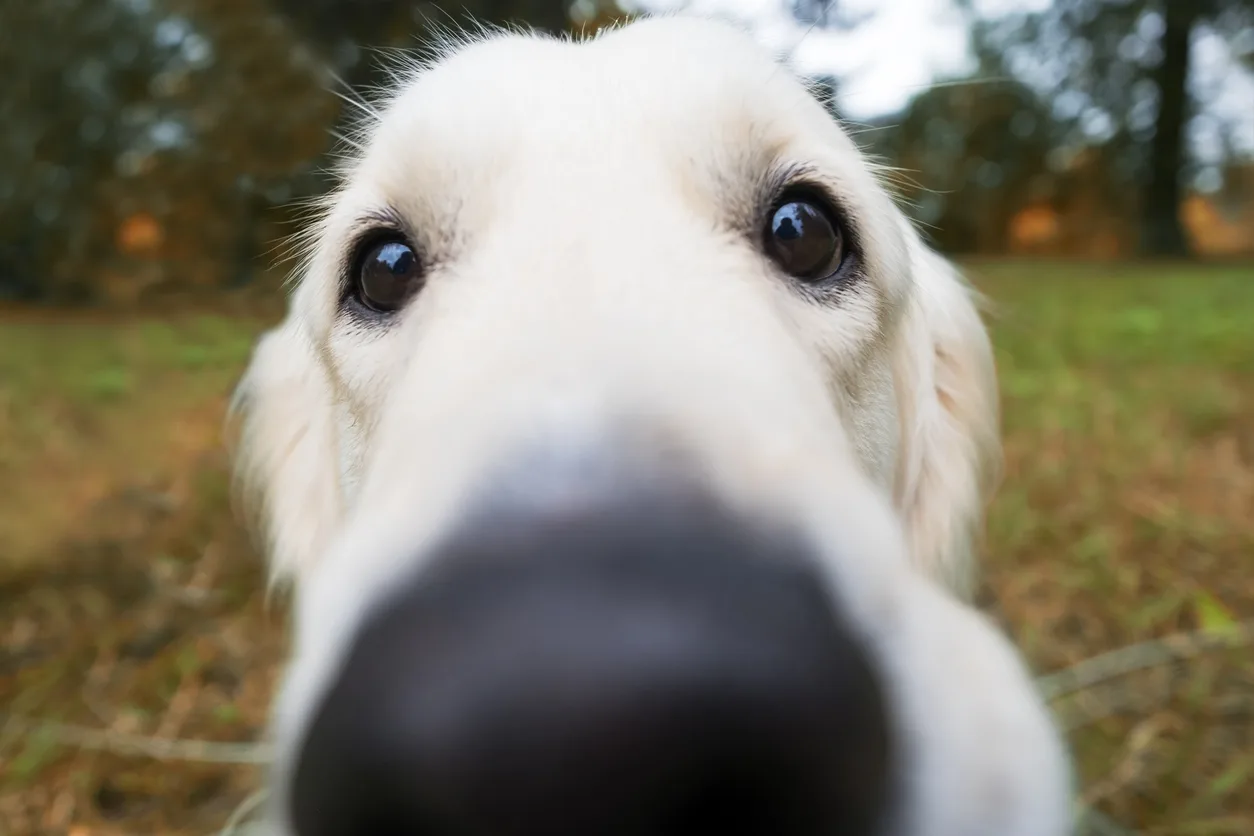For centuries, old wives the world across have said that a dog with a warm, dry nose is a sick dog. To us humans, that seems pretty strange; after all, if our noses are cold and wet, that probably means we have one heck of a cold. But is there any truth to this rumor when it comes to your dog?
It turns out the answer is really more like a mixture of conjecture and the truth, all rolled into one. So grab a cup of tea, snuggle up with the dog, and we’ll try to explain why it’s not always straightforward and how to know if there might be an issue.
Sniffing Out the Facts About Your Dog’s Nose
Before we even talk about your dog’s nose and whether it being wet is good or bad, there’s a few things you need to understand about how the canine nose works. First, know that your dog’s nose doesn’t really operate the same as your nose.
With the exception of the fact that it picks up microparticles and sends messages to the brain, which are then interpreted into meaningful messages, there really isn’t anything else similar about how or why it works the way it does.
Your dog’s nose is a powerhouse of information. Her long snout gives her more area within the nose for translating those aforementioned signals – to the tune of around 300 million olfactory receptors. Even if your pup is brachycephalic, she still probably has about 40 times the scent receptors as a human. This is why your dog seems to trigger to what we perceive as nothing when you’re out on a walk.
Dogs’ Wet Nose and Scent Receptors
So, why is it that the canine nose is wet? Scent particles are easier for your dog’s scent receptors to detect when they’re carried in fluid. Keeping the nose moist also encourages more microparticles to stick to the nose in general, meaning scents are stronger and more likely to translate out into a usable message. A dog with a wet nose can, in fact, smell better, so realistically, a wet nose is sort of healthier.
But that’s just the beginning.
Dog Nose…Sweat?
Dogs also sweat through their noses, a habit most of us probably are happy we don’t share. When they become warm, the outer snout and nose can release fluids from sweat glands that encourage cooling as air passes by. For pet owners, this means that a warm, dry nose may be a sign of a dehydrated dog, especially in warm weather, but it’s not really the guarantee most people make it out to be.
A much better way of detecting dehydration in dogs is to look at the gums; if they’re sticky or tacky, your dog probably isn’t getting enough water. A dog who doesn’t urinate for over 12 hours at a time is also suspect, as is a dog whose skin “tents up” and doesn’t return to its normal position quickly when gently pinched together.
Dog Nose Licking
Here’s something else most pet owners never really even take notice of: your dog probably licks his nose hundreds of times per day. Like blinking, it takes just a few seconds – enough so that most of us become accustomed to seeing it and don’t even pay it any mind. There’s a good reason for this seemingly-strange behavior; your dog is re-moistening his nose and/or clearing away any excessive debris.
Depending on how much your dog salivates, his licking could make his nose very wet or barely wet at all. Getting enough fluids will help him to maintain enough saliva to properly moisten his nose when he needs to.
It’s completely normal for your dog to lick his nose often. Unless you see redness, irritation, scaling, or some other abnormal skin sign, or he begins to lick almost constantly and obsessively, you can leave him to it. Consider it like having a good stretch after you’ve been sitting working for a while.
Is a Dry Dog Nose Bad?
In a word, no, not usually. Dog noses can become dry for a long list of reasons; if the issue is transient, it’s probably just a reflection of the environment he’s in. For example, very hot weather, electric heat, and laying by a fireplace can all cause your pup’s nose to become drier than normal. Once he moves away, drinks some water, or licks his nose, he’ll probably be back to normal once again.
Similarly, just having a good long nap can dry out a dog’s nose, too. Maybe this is why most dogs seem to be similar to us; when they wake up, they grab some water and then head out to answer mother nature’s call. You may see similar behavior after intense exercise or a rigorous play session!
On the other hand, if your dog’s nose seems persistently dry, especially if it’s accompanied by other skin symptoms or signs of illness, it could be a sign that he’s sick. Fevers, rhinotracheitis, and kidney problems that spur on dehydration are rare, but do sometimes happen, especially to dogs in communal living environments.
When Is a Wet Dog Nose Too Wet?
Just as an overly-dry nose can be a sign of illness, so, too, can an overly wet nose. Dogs with a stereotypically runny nose may be suffering from canine colds, canine influenza, issues with the teeth, or even sinus infections. And yes, your dog can experience allergies, and thus, canine rhinotracheale allergy symptoms like stuffy or runny nose and coughing, just as humans can.
Moreover, if your dog has discharge from the nose that’s brown, dark brown, reddish, yellow, or green, it may be a sign of secondary infection. This is cause for an immediate vet visit unless you already know the problem. Some dogs do seem to suffer from chronic snout, nose, and canine sinus infections (often brachycephalic breeds with flat faces) and may need occasional medication off and on for life. Others may have just picked something up at the local dog park and will just need a single round.
Optimum Dog Nose Health and Wellness
So, now you know a bit more about your dog’s nose, how it functions, and why transient dryness isn’t necessarily cause to panic. How can you go about encouraging your dog to keep a healthier nose?
First, be mindful of environmental influences. Play outside, but do be aware that high winds, extreme cold, extreme heat, and high UV indexes can lead to dryness and chapping. Change plans, offer more water, and use a sunscreen for dog noses (yes, that does exist) before you head out.
Also, watch your dog’s intake of potentially drying substances. Anything high in salt or sugar will spur on dehydration – that means keeping his diet healthy and staying away from highly processed human food.
Lastly, just be sure you’re providing him with enough water. Dogs should have open access to water unless they’re obsessive drinkers or have some other issue you’re attempting to mitigate with a schedule. Even if it means going outside once or twice more a day, it’s better for his health and well-being.

